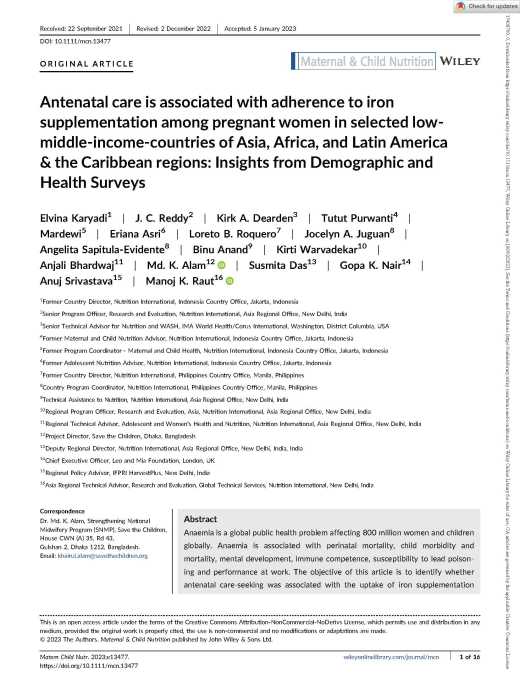Antenatal care is associated with adherence to iron supplementation among pregnant women in selected low-middle-income-countries of Asia, Africa, and Latin America & the Caribbean regions: Insights from Demographic and Health Surveys
Peer Reviewed Articles
Antenatal care is associated with adherence to iron supplementation among pregnant women in selected low-middle-income-countries of Asia, Africa, and Latin America & the Caribbean regions: Insights from Demographic and Health Surveys
Abstract
Anaemia is a global public health problem affecting 800 million women and children globally. Anaemia is associated with perinatal mortality, child morbidity and mortality, mental development, immune competence, susceptibility to lead poisoning and performance at work. The objective of this article is to identify whether antenatal care-seeking was associated with the uptake of iron supplementation among pregnant women, adjusting for a range of covariates. This article used data from the cross-sectional recent Demographic and Health Surveys (DHS) of 12 countries in Asia, Africa and Latin America & the Caribbean regions. The individual-level data from 273,144 women of reproductive age (15−49 years) were analysed from multi-country DHS. Multiple Logistic regression analyses were conducted using Predictive Analytics Software for Windows (PASW), Release 18.0. Receiving at least four antenatal care visits was significantly associated with the consumption of 90 or more iron-containing supplements in 12 low and middle income countries across three regions after adjusting for different household and respondent characteristics, while mass media exposure was found to be a significant predictor in India and Indonesia. Antenatal care seems to be the most important predictor of adherence to iron intake in the selected countries across Africa, Asia, Latin America and Caribbean regions.
Key points
- Receiving at least four antenatal care visits was significantly associated with adherence to 90 or more iron-containing supplements in 12 low and middle income countries across three regions after adjusting for different household and respondent characteristics.
- Antenatal care seems to be the most important predictor of adherence to iron intake in the selected countries across Africa, Asia, Latin America and Caribbean regions.
- The antenatal care (ANC) platform seems to be an effective opportunity and platform to promote iron and folic acid (IFA) adherence.
- These ANC contact points could be utilised to include interpersonal and two-way interactive nutrition counselling to improve adherence to IFA supplementation.
Read the article

